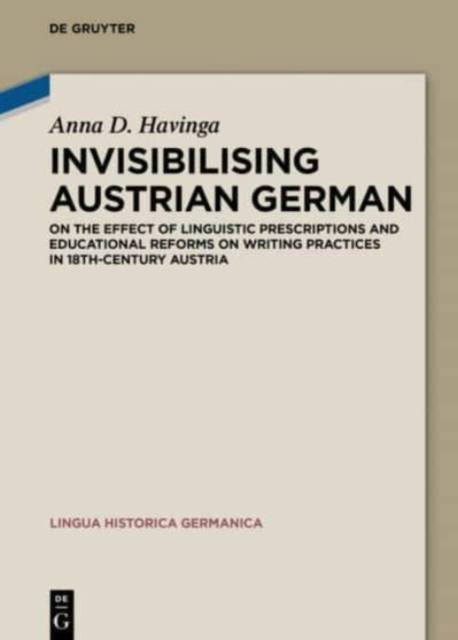
- Afhalen na 1 uur in een winkel met voorraad
- Gratis thuislevering in België vanaf € 30
- Ruim aanbod met 7 miljoen producten
- Afhalen na 1 uur in een winkel met voorraad
- Gratis thuislevering in België vanaf € 30
- Ruim aanbod met 7 miljoen producten
Invisibilising Austrian German
On the Effect of Linguistic Prescriptions and Educational Reforms on Writing Practices in 18th-Century Austria
Anna Dorothea HavingaOmschrijving
This book provides an insight into the standardisation process of German in eighteenth-century Austria. It describes how norms prescribed by grammarians were actually implemented via a school reform carried out by educationalist Johann Ignaz Felbiger on the order of Empress Maria Theresa. Quantitative and qualitative analyses were undertaken of certain Upper German features (e-apocope, the absence of the prefix ge- and the ending -t in past participles, and variants of the verb form sind) in reading primers, issues of the Wienerisches Diarium / Wiener Zeitung and petitionary letters. These reveal how such variants became increasingly 'invisible' in writing. This process of 'invisibilisation', i.e. a process of stigmatization which prevents the use of certain varieties and variants in writing, can be attributed to a number of factors: Empress Maria Theresa's appeal for a language reform, the normative work by eighteenth-century grammarians, the implementation of educational reforms, and the early introduction of East Central German variants in newspaper issues.
Specificaties
Betrokkenen
- Auteur(s):
- Uitgeverij:
Inhoud
- Aantal bladzijden:
- 272
- Taal:
- Engels
- Reeks:
- Reeksnummer:
- nr. 18
Eigenschappen
- Productcode (EAN):
- 9783110546293
- Verschijningsdatum:
- 22/01/2018
- Uitvoering:
- Hardcover
- Formaat:
- Genaaid
- Afmetingen:
- 170 mm x 244 mm
- Gewicht:
- 635 g

Alleen bij Standaard Boekhandel
Beoordelingen
We publiceren alleen reviews die voldoen aan de voorwaarden voor reviews. Bekijk onze voorwaarden voor reviews.











